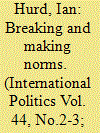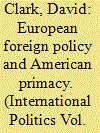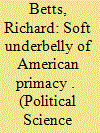| Srl | Item |
| 1 |
ID:
077884


|
|
|
|
|
| Publication |
2007.
|
| Summary/Abstract |
International norms are influential when they are seen as legitimate, and recent American behaviour may undermine the legitimacy of norms on the use of force. I examine three kinds of legitimacy crisis that might arise from American revisionism. First, the US threatens to delegitimate the norms that it challenges, particularly on military preemption. Second, it threatens to undermine its own influence by disassociating American power from one source of legitimation. Finally, it may negate the basic idea of American hegemony as that term is understood in constructivist scholarship and so transform the structure of the international system. Any of these might lead to a crisis, though of different kinds. The American challenge to the customary law on preemption threatens to delegitimize both the existing norms and the social basis of US power, while also attempting to legitimize American interests and new understandings of the norms. It therefore shows the productive and destructive aspects of the power of legitimation in world politics. Legitimation is the link between states and the normative structures of international society
|
|
|
|
|
|
|
|
|
|
|
|
|
|
|
|
| 2 |
ID:
086313


|
|
|
|
|
| Publication |
2008.
|
| Summary/Abstract |
The ideology of American primacy is not new with the Bush administration. Rather it draws upon a long tradition of American exceptionalism. Yet, the unilateralism built into this ideology is not viable as a foundation on which to build a global order, since it assumes that US behaviour is based on broadly-held values and interests, not those of a single state. With the end of the cold war many of the factors that tied the United States to Europe dissolved; moreover, the United States in effect, as its demographic and political centre moved south and west, abandoned many of the values that it shared with Europe. In many ways America's repudiation of multilateralism and welfare capitalism could be seen as a return to the default setting of its founding values. Some analysts argue that Europe faces but two alternative paths in its relationship with the United States - to accept a subservient position, while attempting to broaden Washington's agenda, or a form of 'Euro-Gaullism' in which Europe would break free from US domination. In fact, a third, and preferable approach, exists that would be based on strengthening Europe's position vis-à-vis the United States, while working with the United States in those areas where common values and interests exist. There is no doubt that a united Europe has the potential to play a more independent global role if it is willing to create the necessary decision-making structure and deploy its collective resources more efficiently.
|
|
|
|
|
|
|
|
|
|
|
|
|
|
|
|
| 3 |
ID:
148143


|
|
|
|
|
| Summary/Abstract |
RICHARD BETTS argues that the September 11 attacks were a response to American primacy. He then applies offense-defense theory to explain the intense advantages that terrorist groups have in launching offensive strikes and in exploiting the limited defenses that a nation can put up in this era of globalization and asymmetric warfare.
|
|
|
|
|
|
|
|
|
|
|
|
|
|
|
|